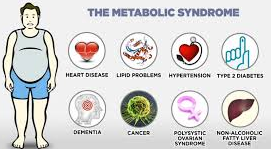“SYNDROME X”
What in The World is That?
And Should I Be Concerned?
The name of that condition sounds pretty scary, doesn’t it? Well, it certainly can be, but before you jump to any conclusions let’s share some information about it.
First, a “Syndrome” is merely defined as a group of symptoms or conditions that together are characteristic of a specific disorder or disease. So, it’s things that arise together as a condition persists – often one causing the other … and vice versa.
One that is quite frequently referenced these days because of the incidence of obesity and overweight conditions in America – and one which many of our clients have been diagnosed with before seeking help from us for their weight loss and wellness – is called Syndrome X. Other names commonly used for this serious ill-health scenario are Metabolic Syndrome, Insulin resistance Syndrome or and Obesity syndrome. Starting to “ring a bell” yet?
In a nutshell, Metabolic Syndrome (the name most commonly used today) is a group of risk factors and/or conditions that arise together as the result of unhealthy dietary habits and resultant weight gain issues, especially abdominal obesity. The manner and timing which the various factors arise among individuals differs, but typically include things like:
- High Blood Pressure
- Cholesterol Issues. Raised triglycerides, low LDL numbers, etc.
- Blood Sugar Problems. People will hear things like Hypoglycemia, Hyperinsulinemia, Glucose intolerance, Insulin sensitivity, etc. or the serious end-result of all that: Type 2 Diabetes.
At this point, it may all start sounding more and more familiar to you. Many people will say “Oh yeah! That’s what they told me I had.” The challenge as we will mention again below is that the conditions associated with this particular “syndrome” have minimal to NO perceivable symptoms. So, it’s like a “ticking time bomb”. The purpose of this short blog is to help you make some sense of it all – and if needed, take some action. Or, perhaps share with someone you care about!
According to peer reviewed research on the Centers for Disease Control website: “By using the definition of metabolic syndrome from the International Diabetes Federation (IDF) and the National Cholesterol Education Program, the prevalence of metabolic syndrome is estimated at more than 30% in the United States”. (See reference source below).
30%! And we have seen even higher estimations. That is epidemic proportions for such a serious set of conditions happening together! Check out some other facts and figures shared on popular health related websites regarding Metabolic Syndrome:
- Metabolic syndrome is present in about 5% of people with normal body
weight. It is present in about 22% of individuals who are overweight,
and 60% of individuals considered obese.

- According to the American Heart Association and the National Heart, Lung, and Blood Institute, WOMEN with waists measuring 35 inches or larger and MEN with waists measuring 40 inches or larger are at risk metabolic syndrome.
- Adults who continue to gain 5 or more pounds per year raise their risk of developing metabolic syndrome by up to 45%.
Experts demonstrate that metabolic syndrome is becoming more common because of rising obesity rates. Having extra fat in the belly increases the risk (especially internal or “Visceral Fat” which we commonly write about here). Even people who are not obese may have an inherited higher risk. This includes people who have parents or other first-degree relatives with diabetes.
Furthermore, as stated above, most of the metabolic syndrome related factors don't have any symptoms. Often, the only outward sign is packing some extra weight in the belly, which usually results in a larger waist. However, be sure to know that this syndrome clearly increases your risk of serious health problems, such as Type 2 diabetes, heart attacks, strokes – and the list goes on and on. Despite the serious risk factors most people don't even know what metabolic syndrome is!
Have concerns about Syndrome X or Metabolic Syndrome as it relates to YOUR health? Or, possibly have friends or family members who may have been told they have this syndrome. It’s serious stuff and if we can, we want to help!
We highly recommend a consultation and computerized Body Composition Analysis (BCA) be done in our clinic in order to determine things like Body Mass Index (BMI), Visceral Fat rating, Body fat Percentage and other factors critical to controlling weight gain and obesity. Knowing your numbers in good detail and exploring strategies to address the underlying causes of Metabolic Syndrome is THE way to start!
Syndrome X is becoming more common. The good news is that it can be controlled. Lifestyle modification is the preferred treatment. Weight reduction usually requires a specifically tailored multifaceted program like the one we provide! Consider GENETIC TSTING to create INDIVIDUAIZED programs along with structured and consistent and awesome SUPPORT. It’s what we do!
Click. Call. Or, just come in!
Reference Sources: 1) Moore JX, Chaudhary N, Akinyemiju T. Metabolic Syndrome Prevalence by Race/Ethnicity and Sex in the United States, National Health and Nutrition Examination Survey, 1988–2012. Prev Chronic Dis 2017;14:160287. 2) www.medicinenet.com
